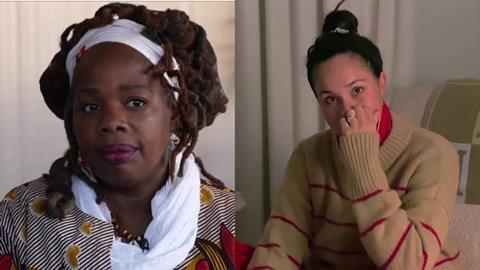After watching the Duke and Duchess of Sussex’s Netflix documentary and reading newspaper reports of Ngozi Fulani’s experience at Buckingham Palace, Chine McDonald challenges Christians not to turn away in discomfort from the racism that still exists in our society

Every black person in the public eye who has spoken up about being on the receiving end of racism has, in the process, second-guessed themselves. They will likely have wondered – if only for a moment - whether the thing they experienced was indeed racist; or whether they were being overly sensitive. Maybe the act or behaviour or question that felt like racism was all in their head. Perhaps there really was nothing to see here, since we live in a post-racial society and so everyone agrees that racism is no longer a thing. Right?
I can imagine both Meghan, Duchess of Sussex and Ngozi Fulani – the black charity leader who detailed her account of being asked “Where are you from?” at an event at Buckingham Palace recently – have, at some point over the past few weeks, wondered whether they should be speaking out about the racism they have experienced.
Such is the level of gaslighting towards black people that we are told to believe any other explanations for the racism that we witness or are the victims of. Many black people – and often black women in particular – are made to question whether their experience was indeed racist, or whether it could be explained away. This is what I have seen time and time again when speaking about racism within the Church. There is a profound discomfort in addressing racism that leads to the denial of its existence.
A destructive force
But what the past few days have shown is that both Meghan and Fulani’s claims were indeed justified; that the racist behaviours and actions were not all in their heads. Racism does exist, and it is a violent, destructive force that we must all play our part in challenging.
Fulani, who runs Sistah Space, a charity that supports women of African and Caribbean heritage who have experienced domestic and sexual abuse, had been invited to Buckingham Palace earlier this month. There, Lady Hussey – the late Queen’s lady-in-waiting - asked the question that black people all over the UK have been asked countless times: “But where are you really from?”
institutional racism does exist – it’s time we all woke up to its realities
Not satisfied with Ms Fulani’s answer, Lady Hussey is reported to have continued her interrogation, invading her personal space in the process. After deciding to share her experience on Twitter, Fulani was thrust into the spotlight. I’m sure her revelation was met with eye-rolls by some who think the incident did not contain any hint of racism. Or, if it did, it should be excused because Lady Hussey is an octogenarian.
Since Fulani’s revelation, she has received mountains of racist abuse and threats of violence on social media – so much so that her charity has had to suspend its activities due to safety concerns.
Speaking out
Like Fulani, Prince Harry and his wife, Meghan, have chosen to speak out about the racism they witnessed. Watching their Netflix documentary, I was struck by how much of the back story to the couple’s turbulent relationship with the Royal Family and the British press was, in their analysis, about race.
Intertwined with images illustrating the couple’s courtship were historians and social commentators such as Afua Hirsch and David Olusoga taking us step by step through Britain’s colonial and racist history. Racism towards Harry and Meghan is at the root of her appalling treatment, and it was time for them to shine a light on it.
Inappropriate coverage
As I watched the footage of Harry and Meghan walking behind Doreen Lawrence at a 2018 memorial service to mark 25 years since the murder of her son Stephen, I was struck by the couple’s commitment to highlighting the racism that still pervades our society. And yet as I searched the internet for information about the event, I came across article after article that instead chose to highlight the “inappropriateness” of the dress that Meghan wore to it (it was sleeveless).
There is a profound discomfort in addressing racism that leads to the denial of its existence
This is what racism looks like. A dark and malevolent force lurking just beneath the surface. A force that tries to lull us all into a false sense of security about its presence; that deflects in order to avoid being rooted out. This is why we cannot ignore it. This is why we have to speak out when we see it, and support others when they do so.
Racism is real
Harry and Meghan have received huge amounts of criticism for their departure from the Royal Family and their claims about racist treatment. I’ve heard many try to explain away the racism towards Meghan, or suggest that her claims about feeling unsafe because of it were unjustified.
But a few weeks ago, assistant commissioner of the Metropolitan Police, Neil Basu, backed up their claims. In an interview with Channel 4 News, he said that there were “disgusting and very real” threats to Meghan’s life, mainly coming from the far right, and that people had even been prosecuted for it.
Racism is real. It pervades every area of our society: from the police to the health service to the education system to politics to the Royal Family to the Church. Rather than suggest – as the government did in its 2021 race report – that institutional racism does not exist – it’s time we all woke up to its realities.
So the least we can do when black people bravely speak out about the racism they have experienced, is believe them.






































No comments yet